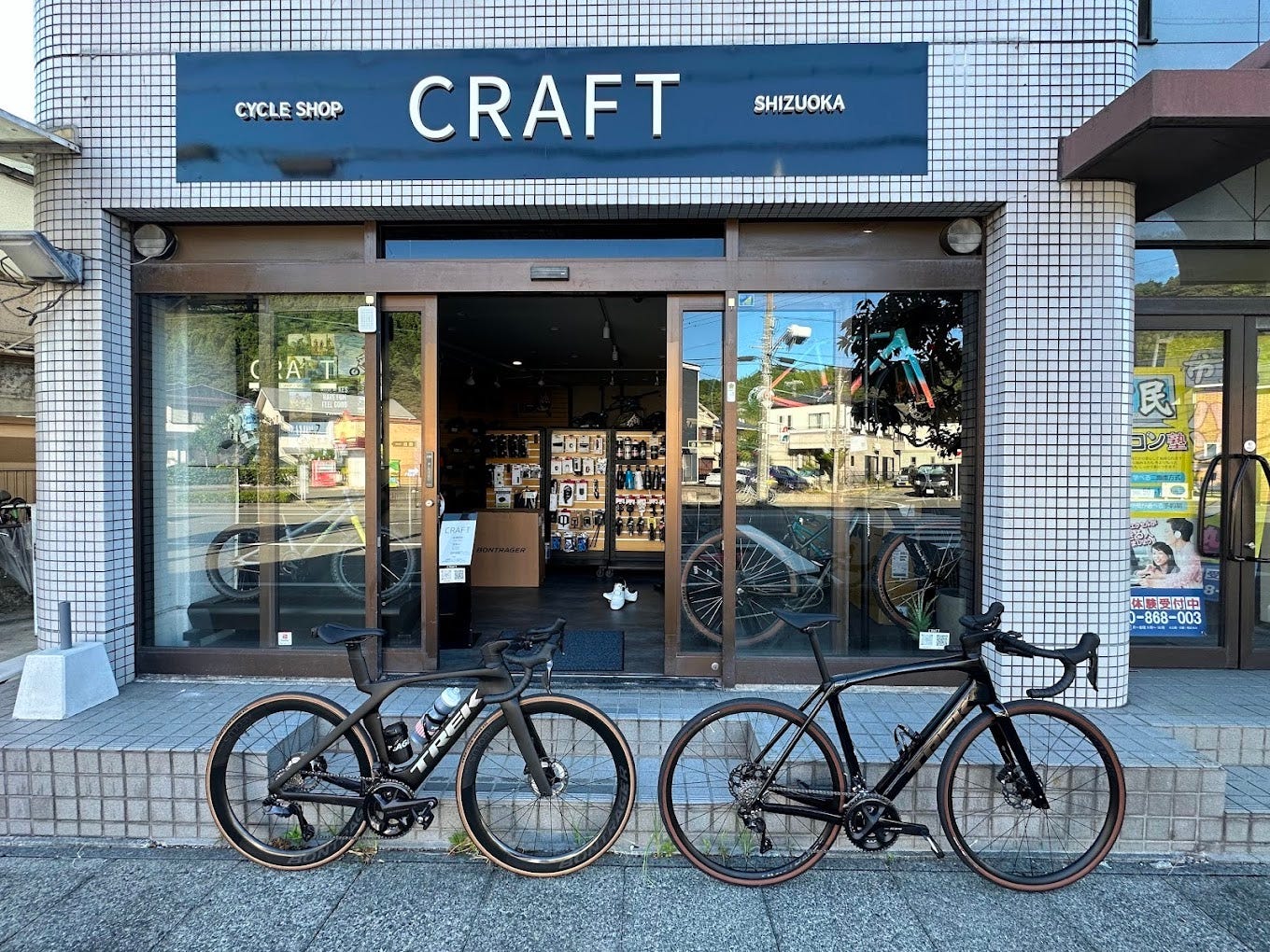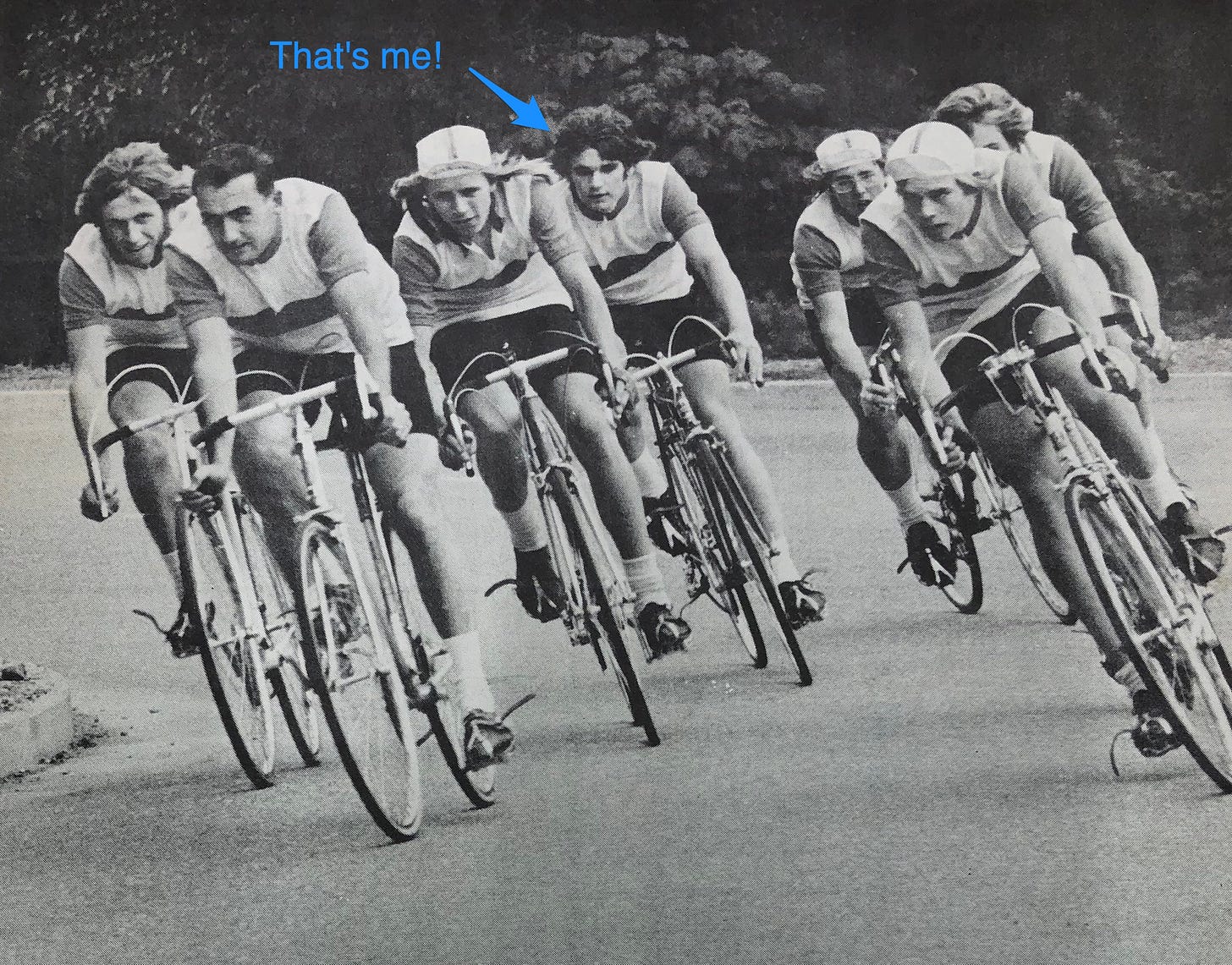Ride a Bicycle: Change the World
A few days ago, on a walk near where I live, I passed by a bicycle shop named “CRAFT.” It was open even though it was Sunday. The shop owner explained he was open for a few hours to do some work, and invited me in. It is one of those small shops that sell only a few things, but the things it sells are special.
In a corner of the shop, resting on a stand, was a bicycle I had only seen in videos being lovingly assembled by mechanics accompanied by cinematic background music: a Trek Madone.
You may wonder why I want one since it costs more than $10,000 US.
A car costing several times that is regarded as a reasonable thing to buy. Wearing a Porsche while driving down the road to get a loaf of bread is fashionable, while riding an expensive bicycle is seen as a waste of money. “You spent HOW much?” friends will say.
In high school, I was a member of a road racing team. A local bike shop had organized cycling tours. After a few rides, a few of us began to wonder how fast we could get if we trained with a coach. We heard about a man working at a nearby hotel who had raced at the Commonwealth Games. We went to his room and knocked on his door. I remember him opening his door and looking out at us teenagers with a bewildered expression. We explained that we knew he was a pretty good rider and asked him if he would be willing to coach us. After a few seconds, he agreed and said, “Yes.”
Over the next two years, coach Claire Bonner would train us until our team became known throughout British Columbia. Two of our riders would reach the national level (alas, not me, in case you were wondering). At the beginning of our cycling journey, particularly in time trials (riding alone against the clock), Claire could soundly beat us. He was hilarious and fun as well.
I remember when we first met Claire. I thought he was a bit stout-looking and impossibly old. Now that I am old, I am amused to remember how old he was then.
He was at the ripe old age of thirty-eight.
Claire was a prankster. On a training ride, Albert, one of our national-level riders, got a flat and stopped to fix it. Claire called out to Albert, “See if you can catch us!” After a few corners, Claire yelled, “Quick, hide in the bushes!” We all got off our bikes and waited patiently in the woods. After about twenty minutes, Albert went whooshing by trying to catch up to us. Claire smiled and said, “Really moving! Ha ha.” We all got back on our bikes and rode to the end of our course, where we found Albert looking around, wondering where we were. When we explained what happened and how impressed we were with his speed when he went by trying to catch up to us, he had a good chuckle as well.
Bicycle frames were made of metal back then. Building a bicycle out of carbon was a distant dream. Titanium was beginning to be used as a building material. It was difficult to weld into frames.
In the early 70s, at a bicycle race in Campbell River on Vancouver Island, I remember admiring a bicycle with a titanium frame. It was lighter than all the other bikes. Just as the race was about to begin, the titanium bike broke. The rider was unable to race.
Over the years, bicycles have evolved into remarkable machines. They are now astonishingly light and even come in models with electric motors.
A reliable bicycle with a steel frame costing a few hundred dollars might be perfect for a student. Something lighter will have an expensive alloy frame. An electric motor makes the bicycle more versatile, but we are getting to the thousand-dollar mark. When an inexpensive battery runs out, the bike becomes harder to pedal. A lighter bike with a longer-lasting battery will again add to the price.
Some bicycles are works of art, like the ones built by Shinichi Konno at Cherubim in Japan. Some are collaborations between major corporations to promote their brands, like the supercar company McLaren’s collaboration with Californian bicycle manufacturer Specialized to create the Specialized S-Works+McLaren Venge racing bike. Other bicycles, such as the Trek Madone, are built for maximum speed, and because they are built from exotic materials to make them strong and light, they will also make your wallet light.
It used to be normal to buy cars for transportation. But the environment has changed. The climate is heating up, and we are in danger of exterminating ourselves.
A bicycle transforms a human into one of the most efficient machines on Earth. It does not require insurance, needs no fuel, and maintenance is uncomplicated and inexpensive.
A car requires a place to rest when it is not moving. Maintenance, particularly if one is unlucky, can be prohibitively expensive, even if you do it yourself.
Admittedly, a car can carry more stuff and will likely be preferred in unpleasant weather. But a bicycle is not merely transport; it is a way to live a healthy life at a slower speed.
When you are the engine that propels your bicycle, you may, if you ride seriously enough, have the exhilarating experience of regularly attaining vehicular speeds under your own power.
Albert, one of the faster riders on our team, was pulled over for speeding.
As you gain experience, you might enjoy the unique sensation of being in a pack of experienced riders bunched very closely together, centimeters apart. The group leader is working hard, but the others following are “drafting,” using over 30% less energy. There is a humming sound from the tires, which are filled to a pressure about three times that of a passenger car to reduce rolling friction. Each member of the group shares the lead to keep the group moving as fast as possible, allowing everyone to stay rested.
I can’t explain what this feels like.
A few kind readers of an early draft asked me to describe this in more detail. It would be like trying to describe the sensation of chocolate ice cream to someone who had never tasted ice cream before. “Sweet” or “cold” doesn’t get you very far.
The best thing I can suggest is to get some chocolate ice cream and taste it.
When you are in a group of cyclists who are pretty good, you are moving along in a tight group at a speed that makes mistakes dangerous. Each rider needs to be acutely aware of the other riders around them. You become part of a superorganism with a changing head. When the group is on and working well together, it is… well…just awesome.
As you improve, your body will transform into a better one. You will sleep more soundly. Your resting heart rate will drop.
For a few thousand dollars, an electric bicycle offers an economical, practical means of transportation. If you intend to ride hundreds of kilometers under your own power—like me—you might want to consider the Trek Madone.
I like the color called “Deep Smoke.”
Have you ever wondered what would happen if everyone bought a bicycle?
There would be a variety of bicycles for every person: old, young, athletic, or couch potato. Bicycle lanes would be replaced by bicycle-only freeways with barriers protecting riders against rain and wind. They would be built over, around, and under the paths of migratory animals.
The word “roadkill” would only appear in historical documents.
There would be places to rest, with fresh fruit and water, as well as the finest coffee and teas. And, of course, charcoal-fired pizza.
In this quiet, safe world, cyclists would ride without fear of being killed by large, rapidly moving machines.
Cars insulate us from the elements and from each other as well. Cyclists are exposed to the sensations around them and to interactions with other people.
If we all rode bicycles, the world would become slower and quieter. I think it is likely that we humans would become slower, quieter, and possibly kinder too.




Such a joy to read! Loved the stories and the details. I had never thought of bicycle only highways. How much more connected would we feel?
This brought back memories! I once on a very expensive bike, which I enjoyed for many years. I passed it onto my son. It was well worth the price!